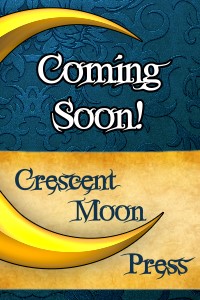Today I have Maer Wilson here to talk about her writing process, a subject I find endlessly fascinating. Her first novel, Relics, is set to be released by Crescent Moon Press on May 1.
 So, you want to know about the process I use to write? The methods to my personal writing madness?
So, you want to know about the process I use to write? The methods to my personal writing madness?
You do realise that going into the mind of a writer can be a dangerous thing, right? I mean, I could tell you stories! No, no, not about me, but about my friends.
Me? I’m actually fairly normal. Sorta, kinda. In a writerly sort of way.
My writing space is at my desk on my pc.
That sounds pretty tame, right? And it is; except that my pc is a gaming computer and set up for ultimate comfort. Yes, that means a footstool under the desk and cushions on my executive chair. Anyway, you get the idea.
I read how friends are writing at lunch on their laptops and such and I envy them a little bit. The most I could write on my laptop is notes.
I need to be at my desk, kicked back with feet up as I type away.
Sometimes I don’t type at all, but use Dragon Naturally Speaking to dictate my novel. About a third of Book Two was dictated. Most often, though, I type, as long as my arm and hand will cooperate.
Music is usually on. Not songs. I don’t’ want to start typing lyrics or anything, but film and gaming soundtracks are great background music. Especially the more epic soundtracks help me stay pumped and crank out the words.
When I’m in writing mode, I write fast.
– The first draft for my first novel (97,000 words) was written in five weeks. –
I wrote a few notes, but mostly I just let the characters take over and the story went places I never thought it would.
Book Two took about nine weeks this past summer, but those were broken up into two stints, one during Camp NaNoWriMo in August.
I have a general idea where my book is going to go, but I’m not always sure how it will get there.
Book Two took an unexpected and (hopefully) awesome turn toward the end.
Major confession time – my entire series has gone places I never expected. I thought I was writing some Urban Fantasy mysteries. Turns out it is a much larger story than that.
I keep a cast list of characters, with ages, relationships, names and years.
Since Book One covers about fifteen years and the series is growing, I need to track some things. That list also has the odd note in it here and there. Lines I want a character to say, something that I want to incorporate. That sort of thing. But there are no outlines and few details.
As the series has progressed, I’ve become more sure what happens in each book. Mostly.
Going into Book Three now, I again know where it’s supposed to be going. Not that there’s any guarantee it won’t take another turn and end up somewhere I hadn’t expected.
My characters can be unruly, fun and surprising, which I love.
They each take on their own lives and I let them tell me their stories. Which is fine with me!
 Besides, if I don’t tell their stories, they hammer and yammer inside my head until I let them out. But that’s perfectly normal, right? See? Like I said before: I’m pretty normal.
Besides, if I don’t tell their stories, they hammer and yammer inside my head until I let them out. But that’s perfectly normal, right? See? Like I said before: I’m pretty normal.
After a successful career being other people, and later teaching others the many tricks of that trade, Maer Wilson has decided to be herself for a while. Turns out she’s a writer. She’s always loved stories, especially fantasy, mystery and sci fi. She has a dragon-themed room in her home, but sadly no dragons in the back yard. When she’s not writing, Maer plays online video games, teaches college and reads. She lives in the high desert of Southern Nevada with her two dogs, a chihuahua and a poodle. Relics is her first novel and will be released by Crescent Moon Press on May 1, 2013. You can visit her website at maerwilson.com.


 Hi, my name is Christine and I’m a pantser.
Hi, my name is Christine and I’m a pantser. Christine Rains is a writer, blogger, and geek mom. She has four degrees which help nothing with motherhood, but make her a great Jeopardy player. When she’s not writing or reading, she having adventures with her son or watching cheesy movies on Syfy Channel. She’s a member of S.C.I.F.I. The 13th Floor series is her first self-published series. She has four novellas and eighteen short stories published. You can buy The Dragonslayer via
Christine Rains is a writer, blogger, and geek mom. She has four degrees which help nothing with motherhood, but make her a great Jeopardy player. When she’s not writing or reading, she having adventures with her son or watching cheesy movies on Syfy Channel. She’s a member of S.C.I.F.I. The 13th Floor series is her first self-published series. She has four novellas and eighteen short stories published. You can buy The Dragonslayer via 
 The 7 Line Challenge works a bit like The Next Big Thing, but instead of a Q&A you go to page 7 or 77 of your manuscript, find line 7, and grab the next 7 lines of text and paste them in your blog.
The 7 Line Challenge works a bit like The Next Big Thing, but instead of a Q&A you go to page 7 or 77 of your manuscript, find line 7, and grab the next 7 lines of text and paste them in your blog. If you’ve been following me in any of the circles I tend to move in, you might know I’m writing a novel about a blind swordswoman, and possibly that I’m struggling with it.
If you’ve been following me in any of the circles I tend to move in, you might know I’m writing a novel about a blind swordswoman, and possibly that I’m struggling with it.









